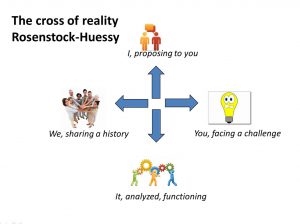 “This is a crucial situation …!” – The word crucial in that sentence means that the person who expresses it is at a crossroads. One can go in different directions. The expression “the cross of reality” means precisely that: one can always go in four directions when dealing with reality. In short, if one continues the line already followed – then one acts out of habit. But one can attempt a new future. Then a break occurs and that means that one starts something new of which one may not yet know how to handle it. One then enters unknown territory. One can also be enthusiastic about something that is not completely new, but has not yet become common to everyone either – then one is looking for allies. Finally, one can also deal with things objectively and establish the facts.
“This is a crucial situation …!” – The word crucial in that sentence means that the person who expresses it is at a crossroads. One can go in different directions. The expression “the cross of reality” means precisely that: one can always go in four directions when dealing with reality. In short, if one continues the line already followed – then one acts out of habit. But one can attempt a new future. Then a break occurs and that means that one starts something new of which one may not yet know how to handle it. One then enters unknown territory. One can also be enthusiastic about something that is not completely new, but has not yet become common to everyone either – then one is looking for allies. Finally, one can also deal with things objectively and establish the facts.
In other words: we continue the past, we start a new future, we are in search of supporters in a common inner space, or we analyze and readjust things outside.
We can also use the metaphor of the seasons.
Spring: something new begins, vulnerable and indeterminate – the future.
Summer: the new unfolds, we acquire support – and create common understanding. We might also say: we create a common present. After all, a common present means that people are synchronized and experience the same thing. They understand each other. From that moment they are inside an established community. The common present and being inside a community are the same.
Autumn: harvesting becomes possible, a phenomenon that was once new is now carried forward by an entire community. It has become common property and thus already part of a common past.
Winter: it has now become permanent and institutionalized. One can analyze and handle it objectively – so it is part of the outside space.
We immediately see that it is not just about four different directions, but also about four different phases. Both is the case. When a new issue arises, we are confronted with the future and we go through the phases: future – present (inside) – past – outside. At the same time, however, we are always at a crossroads. For example, we may be so attached to the past that we are in denial with respect to a new problem. Despite all urgency, we remain on an old track and continue our course. We can also address urgent problems so much that this new problem is the only issue on our agenda. As if all past achievements no longer matter at all. Perhaps we should then better seek to compromise and create common support. That seems safer. But also a compromise can simply be beyond the truth. A so-called compromise can be too much a continuation of the past, or so innovative that it doesn’t find any support. It may also be the case be that the compromise does not reflect outside reality: one cannot want things that simply are not possible. On the other hand, sticking to the facts doesn’t help either. That’s just a fourth one-sidedness. Facts may be facts, but they are not only end points of previous steps, but also starting points of new ones. So the question is constantly: from what perspective does one judge the facts? In short, reality is constantly changing. We never have a guarantee that we did the right thing. In that sense, reality is indeed a cross. We must constantly balance the four directions of our existence.
Four poles, dealt with by grammar
The term “cross of reality” has been coined by Rosenstock-Huessy. But a more important contribution from him consists in reducing these four poles of reality to grammar, that is to our grammatical moods. He has discovered that these four poles have always been known in our grammatical moods. That has been implicitly always the case. Now his method makes that explicit. It has always remained implicit because we have always learned grammatical tables that started with the “I”. “I walk”, “you walk”, “he walks” and so on. It seems as if we conjugate and inflect verb forms. In reality we are conjugated and inflected because we (must) talk to each other about the next step in time.
Imperative
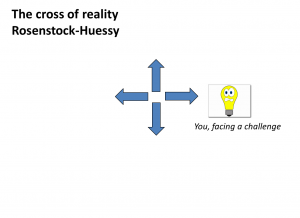 Indeed, we must speak. We have no choice. A new situation, a conflict, an unsolved problem, they represent an imperative. It is always lonely individuals who articulate and act upon such an imperative for the first time. Where no one saw any problems, there was one engineer who, for example, already foresaw that natural gas extraction in the province Groningen in the Netherlands would lead to soil subsidence and that it would damage entire villages. Everybody was in denial. Also when opportunities do arise, lonely individuals often are the first to notice them. The engineer who conceived the idea of connecting east and west in America with railway lines has not grown rich from it. Others did. Therefore, such initiators are not always appreciated because they go against the flow. In the cross of reality, the imperative is at the pole of the future. A new problem, a new assignment, a new opportunity is coming our way.
Indeed, we must speak. We have no choice. A new situation, a conflict, an unsolved problem, they represent an imperative. It is always lonely individuals who articulate and act upon such an imperative for the first time. Where no one saw any problems, there was one engineer who, for example, already foresaw that natural gas extraction in the province Groningen in the Netherlands would lead to soil subsidence and that it would damage entire villages. Everybody was in denial. Also when opportunities do arise, lonely individuals often are the first to notice them. The engineer who conceived the idea of connecting east and west in America with railway lines has not grown rich from it. Others did. Therefore, such initiators are not always appreciated because they go against the flow. In the cross of reality, the imperative is at the pole of the future. A new problem, a new assignment, a new opportunity is coming our way.
Subjunctive
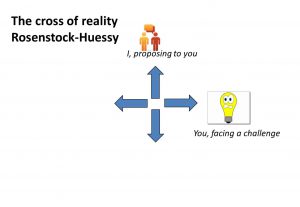 In English the subjunctive is represented with “would”: would you like to participate? In the subjunctive mood we suggest a possibility to the other and we invite. We make a proposal. In English, to propose also has the meaning of proposing for marriage. Conjunctive literally means union and it also includes the Latin word for marriage. We try to arrive at a common understanding of reality and thus make proposals and counter-proposals.
In English the subjunctive is represented with “would”: would you like to participate? In the subjunctive mood we suggest a possibility to the other and we invite. We make a proposal. In English, to propose also has the meaning of proposing for marriage. Conjunctive literally means union and it also includes the Latin word for marriage. We try to arrive at a common understanding of reality and thus make proposals and counter-proposals.
Participative
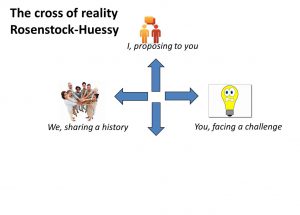 The participle, the past participle, indicates that a common path has been traveled and thus a common past created in sentences like: We have fought. We have walked. In common action, a community is created. This leads to an insight that is particularly important at a time when people feel there is a lack of community. Organizing all kinds of non-binding activities that bring people together does not create a community. Such a community evaporates as easily as it came together. A common task, where people roll up their sleeves together, or a common crisis, that is what really ties people together.
The participle, the past participle, indicates that a common path has been traveled and thus a common past created in sentences like: We have fought. We have walked. In common action, a community is created. This leads to an insight that is particularly important at a time when people feel there is a lack of community. Organizing all kinds of non-binding activities that bring people together does not create a community. Such a community evaporates as easily as it came together. A common task, where people roll up their sleeves together, or a common crisis, that is what really ties people together.
Indicative
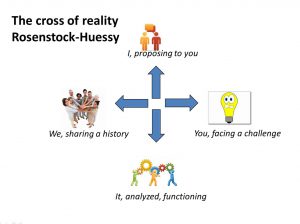 The indicative indicates facts and conditions. There is a house over there. The plants are left dry. The bicycles are still outside. Incidentally, the last two examples are no longer merely a statement of fact. The coffee is ready! – That’s an invitation. Facts that are at the end of the cycle of imperative – conjunctive – participative – indicative often also reopen that cycle. When we see frozen or petrified conditions, we easily experience it as a new appeal or call.
The indicative indicates facts and conditions. There is a house over there. The plants are left dry. The bicycles are still outside. Incidentally, the last two examples are no longer merely a statement of fact. The coffee is ready! – That’s an invitation. Facts that are at the end of the cycle of imperative – conjunctive – participative – indicative often also reopen that cycle. When we see frozen or petrified conditions, we easily experience it as a new appeal or call.
The cross of reality and the reality of the cross
Reality is cross-shaped. We are always at a crossroads. That has been the case always in all cultures. The best proof of this is that the grammar of language has plied its grammatical forms around those different moods and temperaments. We express in language what we experience and that is what it also makes possible to experience (well) what we are submerged in. In fact, we often think that we find in nature what we actually derive from our experience with each other. The Greek distinction of four elements of fire – air – hydrogen – matter not only shows the four aggregation states of nature, but also indicates the rhythm of inspiration:
Fire: imperative
Air: subjunctive
Water: participative
Matter: indicative
In the heat of the new inspiration, a new process begins. Once room is created for new insights, we can breathe again and that happens as soon as we find allies. When a community is established, there is a stream flowing in the right direction. And eventually the original inspiration becomes solid and petrified.
Yet there is a connection between the cross of reality and the reality of the cross: the cross of Christ in the middle of history. Existence is rhythmic. We all have to give up a mode of existence each time to open a new way into the future. Self-sacrifice is the precondition for self-development.